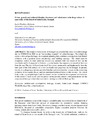Identificador persistente para citar o vincular este elemento:
https://accedacris.ulpgc.es/jspui/handle/10553/52593
| Título: | Urban growth and cultural identity; fractures and imbalances in heritage values: A case study of the island of Saint-Louis, Senegal | Autores/as: | Martínez-Quintana, Lucía Cáceres-Morales, Eduardo |
Clasificación UNESCO: | 6201 Arquitectura 531290 Economía sectorial: turismo |
Palabras clave: | Architectural development Heritage Islands Saint-Louis Senegal UNESCO World Heritage Site, et al. |
Fecha de publicación: | 2016 | Publicación seriada: | Island Studies Journal | Resumen: | The island of Saint-Louis of Senegal was awarded the status of world heritage site by UNESCO in 2000 as an “outstanding example” of urban heritage. This island city comes with a unique heritage: development planning that combines a strong historical French influence with a gridiron urban morphology and building typology. The island must be interpreted within its total territorial context that includes both the island of Sor (on the mainland) and La Langue de la Barberie, a sandy barrier that separates the mouth of the river from the sea. The city of Saint-Louis itself has grown enormously and haphazardly from the latter part of the 20th century: it is now the fourth most populous city in Senegal. At present, the city is undergoing a serious period of decline and recession due, in part, to the overriding influence of the capital, Dakar, and the centralized political forces in the country. This article looks at the key morphological and functional reasons behind the development and evolution of the island of Saint-Louis and that persist in the present context, with justifications for the deep-rooted heritage values that maintain its prestige as a World Heritage Site. | URI: | https://accedacris.ulpgc.es/handle/10553/52593 | ISSN: | 1715-2593 | Fuente: | Island Studies Journal [ISSN 1715-2593], v. 11 (1), p. 291-306 |
| Colección: | Artículos |
Citas SCOPUSTM
4
actualizado el 08-jun-2025
Citas de WEB OF SCIENCETM
Citations
3
actualizado el 25-feb-2024
Visitas
56
actualizado el 10-ene-2026
Descargas
5
actualizado el 10-ene-2026
Google ScholarTM
Verifica
Comparte
Exporta metadatos
Los elementos en ULPGC accedaCRIS están protegidos por derechos de autor con todos los derechos reservados, a menos que se indique lo contrario.
